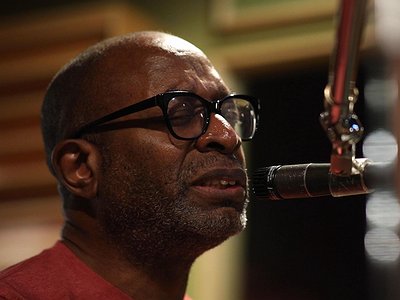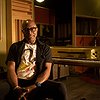Part 2
Can you talk about a breakthrough work, event or performance in your career? Why does it feel special to you? When, why and how did you start working on it, what were some of the motivations and ideas behind it?
I suppose Winter in America would be that work. It was my initiation into making a record from scratch. I learned a lot about recording and managing time and expectations, expenses and musicians and a little about the language of musical engineering under the guidance of Jose Williams, Washington, DC - area producer/engineer extraordinaire. Gil and I couldn’t afford to hire the Ron Carters and Bernard Purdies of our previous sessions produced by Bob Thiele. We were on our own, so we did most of the parts ourselves. Our school buddies Danny Bowens and Bob Adams from Lincoln University, Pennsylvania came down to help add bass and drums to some of the tracks – for love – because we couldn’t pay them, either.
Winter in America was to be a musical novel. It was around the time that young Black men were coming back from the recently-ended Vietnam war and they were in all kinds of bad shape. Drugs, PTSD, depression, missing limbs – and on top of that, they return from that horrific war thinking that at least now America would finally regard them as men of honor and treat them with the grateful respect they were due – only to find out that nothing had changed. They were still spat upon and marginalized the way they were before they left.
Our story was about what that might have looked like with a protagonist, played by Gil, who spoke in interludes between songs, about some of those what could have been going on in his mind, which would lead into another song on the album. Let’s just say it was no What’s Goin On by Marvin Gaye, and we decided that some of the songs were just too depressing! We ditched the most cringeworthy ones and rolled with the eight that still kind of conveyed the overall feeling of what we were trying to convey.
It still blows me away how, amidst some of the big, slick productions of the time – full, killer bands and 5-piece harmonies – all these years later, those songs resonate with folks of all ages and cultural identities. Among some it is even considered a classic. Just two young brothers with hardly any real experience trying their hand at making a record. I’m beyond honored and proud to have been a part of that.
There are many descriptions of the ideal state of mind for being creative. What is it like for you? What supports this ideal state of mind and what are distractions? Are there strategies to enter into this state more easily?
The ideal state of mind for creativity – I don’t know if that really exists for me. We picture the artist, alone, focused on coaxing those faint sounds floating in the ether into a recording … but the music I make is created from several different states of mind – most of them far less than ideal. I don’t find inspiration from the ideal; life constantly distracts us from what we intend to do. I don’t always fight those distractions, I let them have a say. There’s an authenticity to that that speaks to who I am.
Music and sounds can heal, but they can also hurt. Do you personally have experiences with either or both of these? Where do you personally see the biggest need and potential for music as a tool for healing?
I can’t think of a time that I was hurt by a piece of music. There are times I have felt assaulted by music, but maybe that was its intent, so I went with it.
I have had many more experiences being healed by music – even some of what I initially thought to be assaultive music often turned out to be healing, cathartic.
Some of John Coltrane’s later music – for example (think Coltrane Live at the Village Vanguard Again!) – originally felt overwhelming, even troubling.
But as I relaxed and listened to it without judgement, I actually found that what I thought was making me uncomfortable became cathartic. In the end, many of these types of pieces helped me to find peace, became a means for reflection and meditation.
For years I have been aware that music has been used to heal people physically and psychically. There is a lot of research on the power of sound.
In the end, I believe that your intent when you make music is transmitted. If you are at peace when you are creating and wish to convey it, the music will be peaceful. Whatever emotions you wish to communicate, if you have the right tools, you will be able to steer your composition in that direction –and then something magical happens and, through the music, those ideas and feelings are amplified and universalized so that, regardless of the listener’s cultural orientation, it is clear to them.
There is a fine line between cultural exchange and appropriation. What are your thoughts on the limits of copying, using cultural signs and symbols and the cultural/social/gender specificity of art?
Again, we need to focus on intent, but this time the intent is sometimes obscured. Sincere experimentation with various artforms not natively familiar is something that has gone on in music and in art forever. I’m not the Art Police. I don’t concern myself about whether someone has borrowed an idea here or there. But there are many artists who “borrow” without giving back and worse, without giving credit to the “lender,” who, in the worst-case scenario, is unaware of the loan. There are even those who try to own certain forms of art as if they were the innovators of it. They obviously consciously do this on order to control the revenue that flows in as a result of the original works. It’s a common music business practice and it still goes on in different ways.
But there is also an unconscious desire to be seen as the initiator of all things of value, to gain a higher status in humanity, a superiority that doesn’t in reality exist among human beings. We are all of value, no more or less than any other of us.
Many artists are suspicious of everyone because of how those who came before them were treated. They were ripped off, stolen from, tricked and discarded. There are those who are tired of wasting precious creative time trying to ascertain who is honest and who wants to steal from them. They are tired of being wrong about people who seemed truly sincere only to be stabbed in the back. “Better to just stay away,” they think. And I understand that. The problem is, creating comes with a need to share what we create with others. It is also how we get enough to eat and keep a roof over our heads.
What would happen if we stopped sharing our work anyway? As soon as we put it out there, it’s subject to be borrowed, stolen or appropriated; for many though, it is inspiring, seeds new ideas, makes others curious about the heritage from which it arises. I think the majority of artists understand that – and for the sake of the art, they continue to openly share their ideas and collaborate. But it’s not always easy.
I haven’t done music primarily for money. I’ve been fortunate not to have to. I don’t worry about people using my work as a basis for their creative endeavors.
But I would not like people to steal my work or the work of an individual or a culture and try and act as if they created it. When you feel a need to take credit for someone else’s work, it’s a dead giveaway that you are bereft of innovative ideas yourself. I think that the general public doesn’t even think of these things. They hear something, they like it. They don’t really know or care where it originally comes from. In the US, they are now trying to stop teachers from teaching about the history of how certain social and cultural phenomena came to be, so it has become more and more obvious how, as parents, we have a responsibility to teach our children the truth. It’s always been our responsibility ultimately.
Our sense of hearing shares intriguing connections to other senses. From your experience, what are some of the most inspiring overlaps between different senses - and what do they tell us about the way our senses work?
The most obvious – and apparently most stunning – is the connection between sight and hearing. The connection between dance and music – and between film and music – is powerful.
I believe that light and sound are most related. Maybe it’s because their frequency spectra are close and most quantifiable. Our brains are very good at interpreting the vibrations that sound and light make in a very uniform way, in a way where we all mostly agree.
I have always believed that if you really want to get a message across, involve as many senses as you can.
What can music express about life and death which words alone may not?
I don’t really know much about death so I don’t think I’m well qualified to express much about it – I can write about the effects of the deaths of others on my psyche. Anything I do about death would actually be about loss or grief or fear but then that’s about something that happens to me as I am alive. I can only write about my experiences as a living being. Music is all about life, all about what we experience or have experienced. Music can help with the pain of loss when we lose people we love. It can remind us to be courageous in the face of death, it can tell us that some things are worth dying for.
Music can help us wordlessly. I believe that, before there is a word for a feeling or even a thought, there is a sound for it and often that sound is more precise at expressing that thought or a feeling.






